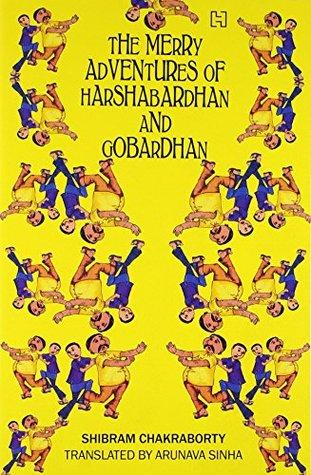

USUALLY, in films, we are familiar with this thing called the ‘comic timing’. Actors who can successfully convert the funnies from off the page to the screen, breaking it down into split-second visual narratives without missing a beat are often revered for their uninhibited body language and fluidity on screen. With books, however, this comic timing is supplied by us, the reader, in our imaginations, which are in turn fuelled by the uninhibited and fluid words specifically chosen by the author to bring in precisely that effect. It is a strange case of assumed free-will and subtle direction. The only time I feel like the Mr.-India-Chaplain-scene-Sridevi is when I read PG Wodehouse, Asterix or Andrea Camilleri’s works. It is as if their words are disguised in costume and make-up – they sing, they dance, we hum along and the refrain becomes irresistible over time. And now I add Shibram Chakraborty to that list.
Shibram Chakraborty’s ‘Merry Adventures of Harshabardhan and Gobardhan’ is relentlessly entertaining, like a musical that bursts into colour every few pages. This collection – such a precious collection! – has 20 short stories translated from the original Bengali by the uber-talented Arunava Sinha, and narrates the stories of the brothers, Harshabardhan and Gobardhan, timber merchants in Calcutta by profession and adept comedy artistes by word. They range from the mundane to the absurd in delightfully unpredictable ways and it plays entirely with words and situations like two chess grandmasters at a final – you can’t help but marvel at Chakraborty’s sheer stamina for puns and talent for situational comedy, and you never know which way the story is going to go. He puts himself, too, in many of the stories. So we have the brothers – along with such inspired characters like Dr. Ram – travelling, arguing, holidaying, working, talking, being kidnapped and robbed, and even dying (and coming back to life), and giving us neatly wrapped gifts of laughter – sometimes even before you tear open one the next arrives – in between it all.
Here’s a little sample from the story ‘Harshabardhan’s Farsightedness’ when he gets a notice from the Assam government to enlist in the army. During his interview, Harshabardhan is asked:
‘Which division in the armed forces would you like to enlist in?’
‘I beg your pardon?’ Harshabardhan did not understand the question.
‘There are several divisions, you see. Infantry division, armoured division, airborne division....’
‘I want to be a general straightaway,’ Harshabardhan informed him.
‘Are you mad?’ The recruiting office couldn’t help asking.
‘Is that a precondition?’ Harshabardhan enquired. ‘Must I be mad before I can be a general?’
Arunava’s translation has not only brought out the flavour of Chakraborty’s brilliance with words, but you can even get a whiff of Bengali’s lilt in the way the sentences are constructed. I only wish there was more attention paid to the proof-reading, because ‘sunset’ becomes ‘unset’ and ‘doctor’ becomes ‘dogtor’, and in a book revelling in the ‘wordliness’ of things, you begin to wonder if even the typos are really typos.
Fully recommended for young adults and old adults, and I-need-a-break-from-adulting adults.